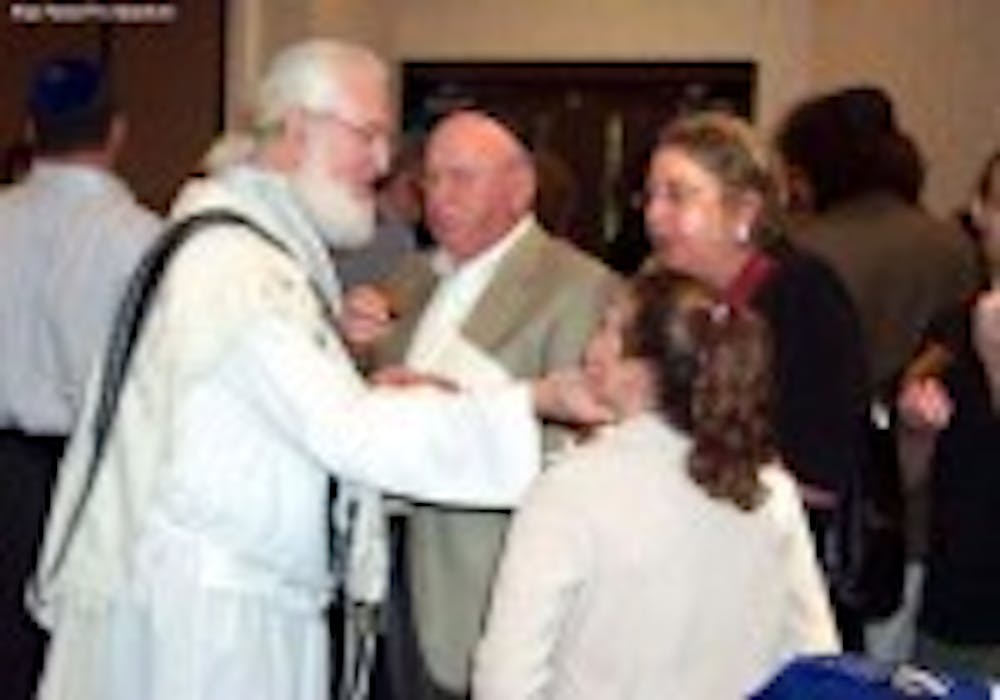Jewish students, faculty, and community members turned out across campus Wednesday and Thursday to celebrate Rosh Hashana, the Jewish New Year.
A day that is both solemn and celebratory, Rosh Hashana is traditionally regarded as the birthday of the world and runs from sundown Wednesday to sundown Friday. All UB students were given Thursday off as observant and non-observant Jews alike marked the start of the year 5765.
In support of the holiday, the Jewish student organization Hillel held an informal dinner at Pistachio's in the Student Union Wednesday evening before services.
According to Andrea Jacobs, director of Hillel, the dinner was supposed to give attending students the feel of a "home away from home."
" To be honest, I am thrilled with the way the dinner turned out," Jacobs said with a bright smile. " I was expecting 35 people to show up, but instead I was surprised to greet a staggering 50."
Jacobs said that if there was one point she wanted to make, it was that this dinner was a way for the UB community to branch out and meet other people and to relax in a fun, social setting.
"This dinner is not about being religious, but about coming together for an hour and to feel part of something," Jacobs said.
Many Jewish students went home for the High Holidays and a five-day weekend, but those who stayed on campus said they were happy to have an organization like Hillel. Dan Cohen, a freshman undecided major, said he was disappointed he had to stay in Buffalo, but was grateful to have someplace to go for Rosh Hashana.
"It is good to know there is an active Jewish community at the university," he said.
After the dinner, participants donned kipot and tallit -- traditional head coverings and prayer shawls -- and held an evening service in 145 Student Union. Rabbi Shay Mintz, a UB figure in the Jewish community for decades who recently returned from Israel, led the congregation.
For many Jewish students, Rosh Hashana is synonymous with going to services at temple or synagogue.
"Other than having dinner with your family, temple is the only other activity I can think of that we partake in," said Dave Goldberg, freshman chemistry major.
According to Jewish tradition, Rosh Hashana is the time during which the Book of Life is opened for people to reflect on themselves and the past year. One of the most recognizable symbols of Rosh Hashana is the shofar, or ram's horn, which is blown during the holiday.
And not to be forgotten are the foods of Rosh Hashana. On both nights, it is customary to eat foods that symbolize sweetness, blessings and abundance. Following the Thursday morning service, which over 150 people attended, apple slices and challah -- traditional Sabbath and holiday bread -- were dipped in honey to symbolize the hope for sweetness in the coming year. In some Jewish traditions, carrots are served as a side dish as a symbol of abundance and plenty.
When the sun goes down on Friday, Rosh Hashana will be over, but that won't be the end of the Jewish High Holidays. That comes on Yom Kippur, the Day of Atonement, which falls on the eve of the tenth day of Tishrei.
This year, Yom Kippur starts at sundown, Friday, Sept. 24 and ends Saturday evening with the sounding of the shofar. It is the holiest and most solemn day of the year, a day of fasting and prayers, and unlike Rosh Hashana, is only celebrated on one day everywhere.





